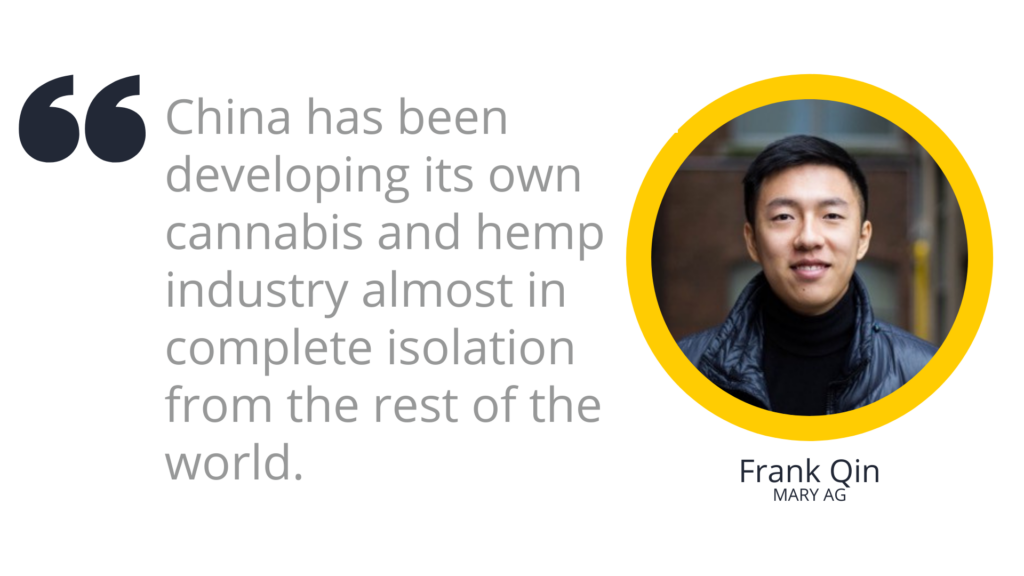From the Editor
Hi there,
Today is the 71st birthday of the People’s Republic of China. National Day has been celebrated every October 1st since the Chinese Communist Party founded the PRC in 1949.
This year, with relations between China and various western powers at an “all-time low”, the holiday has become a flashpoint. The Ontario legislature, for example, was forced to cancel plans to raise the Chinese flag – a fairly routine and symbolic gesture that was to be attended by lawmakers from every major party out of respect for Ontario’s 700,000+ Chinese residents – as tensions continue to escalate.
Beijing deserves much of the global ire it faces, having violated international laws along with the basic human rights of millions of its own citizens with impunity for decades…but at this point, you might (rightfully) be asking yourself: WTF does any of this have to do with cannabis?!?
Well, if your goal is to reduce tension, a little weed will often provide that result. Read on to learn how that logic applies to deescalating one of the scariest conflicts human civilization has ever seen.
Yours in pursuit of progress,

Volume 1: Issue 3
The Path to Peace with China is Paved with Pot
by Jameson Berkow
China is already quietly relaxing its staunchly anti-cannabis policies. That process represents massive economic opportunities for countries with existing legal cannabis sectors, but it also makes for another method of pressuring Beijing to stop abusing human rights and to start playing by international rules.
As a symbol of peace, the old olive branch is so over.
Cannabis flower, on the other hand, could be the key to reducing tensions between the world’s most populous (and arguably most powerful) nation and the ambiguous group of nations known as “the west.” At first glance, the increasingly liberal cannabis policies and social attitudes in North America and Europe could not be more opposed to the staunchly anti-cannabis view that constitutes official policy in China.
Take a broad enough historical perspective, however, and those differences start to disappear.
“It is only about 150 years old, this shift in attitudes on [cannabis] towards the negative in China,” Gordon Houlden, a former Canadian diplomat who held five postings in China before joining the University of Alberta as director of its China Institute, said in an interview. “It is not 1,500 years old, so when that changes you would have a different situation. Over time, the Chinese may mellow.”
This issue of Weekly Chronicle is part of a 4-week free trial. Until October 16, take advantage of our introductory offer for just $99/year.
According to Frank Qin, the mellowing process is already well underway.
“China has been developing its own cannabis and hemp industry almost in complete isolation from the rest of the world,” said Mr. Qin, Co-Founder and CEO of Canadian cannabis startup Mary AG. Indeed, data from the World Intellectual Property Organization shows 306 of the 606 cannabis-related patents filed globally are held by companies and individuals based in China.
His company is planning to build a US$15-million processing facility in China’s southernmost province – where most of the country’s hemp production is based – to be among the first dozen Chinese entities licensed to produce cannabis extracts. THC is still forbidden, Mr. Qin notes, but plenty of cannabis-related products are still perfectly legal under Chinese law.
“Currently in China, cosmetics and topicals and really anything [limited to] external [use] has been legalized,” Mr. Qin said, noting several recent studies have predicted Chinese CBD demand will explode as the trend expands beyond the largest cities.
“How hype is created in China is just incomparable to any other market in the world,” Mr. Qin said. “Every time a trend like botox or plastic surgery becomes available, even people who don’t need it want it because it is hot right now.”

As China continues to mellow its views towards cannabis, the opportunity for political and social progress will continue to grow. First and foremost because the Chinese relationship with cannabis has long been connected with peace and individual liberty.
The Divine Farmer’s Classic of Materia Medica, a text from the first or second century, said “prolonged consumption [of cannabis] frees the spirit light and lightens the body,” according to a translation cited in a recent issue of the academic journal Frontiers in Pharmacology.
That connection is arguably even stronger today, as the Chinese cannabis cultural community, Wisman 420, makes clear in a recent YouTube interview: “The most important thing for us is about the freedom of the spirit and cannabis is like a symbol for freedom. We want to pursue freedom and democracy in China,” one of the group’s leading members said in the video, posted in early 2018.
Weekly Chronicle is made possible with support from:
See how can Gallagher help your cannabis business.
China, like many other countries around the world, is struggling to find new government revenue sources as an aging population and the economic impacts of COVID-19 continue to drain public coffers. Cannabis has been touted as low-hanging fruit by various other jurisdictions and despite China’s substantial land mass, Mr. Houlden believes the country could quickly become a net cannabis importer.
“China is large but they don’t have the amount of arable land that we do [in North America]” he said. “Over time, I am convinced that we could outpace them easily in cannabis production, just as we already do in canola and various other agricultural commodities.”
Closing the export gap is the key to improving east-west relations, Mr. Houlden said. Canadian imports from China currently outnumber exports by a roughly three-to-one ratio.
“You need to have more people [in western countries] who earn their living via exports to China if you want to improve the political relationship,” he said.
Increasing exports to China would also increase Chinese reliance on external sources of supply, which would give those sources greater leverage to push Beijing away from its hard-line authoritarian governing style. It may not be enough to immediately stop the genocide of China’s Uighur minority, the continued illegal supression of democracy in Hong Kong or the pointlessly cruel ongoing detention of two Canadians.
It might not be nearly enough, but it is at least a potential starting point; a small bridge over dangerous rapids where currently no other crossing exists.
“There is certainly an obstacle that the current generation of leadership is trying to overcome, but as a Canadian company we always try to be a bridge between those two worlds,” said Mr. Qin.
“It is definitely interesting to think about how weed could be the bridge here.”

























